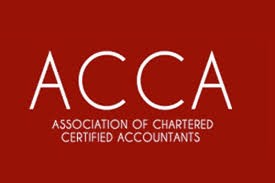ACCA
- INTRODUCTION
- COURSE
- CAREER OPPORTUNITIES
- ACCA EXAMS
- EXAM DETAILS
- SKILL SET
- ACCA Specialisations
- ROLES AND RESPONSIBILITIES

Association of Chartered Certified Accountants is a leading international accountancy body. The ACCA qualification is recognized and is treated in other countries as being equivalent to their local qualification.
It enables us to become a Chartered Certified Accountant, use the designatory letters ACCA, and work in any aspect of finance or management in any business.
The ACCA syllabus consists of 14 examinations. The Fundamental level includes 9 examinations (F1 – F9).
From the Professional level, you must complete 5 exams prior to receiving your certification.
This includes papers P1, P2, and P3, which are compulsory, followed by 2 out of the 4 optional papers P4, P5, P6, and P7.
There are four paper exam sessions each year, and computer-based exams are also available on-demand for some papers.
Depending on your previous qualifications, you may also be exempt from certain papers.
How does the ACCA Qualification work?
Students’ progress through three elements of the ACCA Qualification on their journey to ACCA membership, these are:
- ACCA exams
- An Ethics and Professional Skills module, and
- A Practical Experience Requirement
CAREER OPPORTUNITIES
- Internal Auditor
- Financial Accountant
- Management Accountant
- Business Analyst
- Financial Analyst
- Risk Manager
- Treasurer
- Credit Control Manager
- Insolvency Practitioner
- Chief Financial Officer (CFO)
- Compliance/Governance Cashier Officer
- Cashier
Applied Knowledge
The Applied Knowledge exams provides students with a broad introduction to the world of finance and develop your essential understanding and techniques in accounting. These exams are:
- Accountant in Business (AB)
- Management Accounting (MA)
- Financial Accounting (FA)
Applied Skills
The Applied Skills exams build on existing knowledge and understanding and develop strong, broad and practical finance skills required of future strategic professional accountant in any sector or industry. These exams are:
- Corporate and Business Law (LW)
- Performance Management (PM)
- Taxation (TX)
- Financial Reporting (FR)
- Audit and Assurance (AA)
- Financial Management (FM)
Strategic Professional
The Strategic Professional exams prepare students for future leadership positions. They develop the strategic vision using your unique blend of technical, ethical and professional skills. And you can specialise in areas that best suit your career ambitions. Students must complete both Essentials exams and choose two of the Options. These exams are:
Essentials
- Strategic Business Leader (SBL)
- Strategic Business Reporting (SBR)
Options
- Advanced Financial Management (AFM)
- Advanced Performance Management (APM)
- Advanced Taxation (ATX)
- Advanced Audit and Assurance (AAA)
Ethics
The Ethics and Professional Skills module uses realistic business situations to introduce a range of advanced ethical and professional skills, preparing you for a successful career as a trusted and confident professional accountant.
In an interactive environment, the module supplements your technical knowledge by helping you develop the ethical and professional behaviours you’ll need to successfully complete your Strategic Professional exams as well as preparing you for a successful career.
Related competencies
- Strategy and Innovation
- Leadership and Management
- Stakeholder Relationship Management
- Ethics and Professionalism
- Audit and Assurance
- Advisory and Consultancy
- Data, Digital and Technology
Practical Experience Requirement
Experience is an integral part of the ACCA journey. This is what sets us apart from the academic path. It shows that not only you can pass the exams but you can also prove your effectiveness in the workplace. Through PER you can develop the knowledge, skills and behaviours learned through the exams.
Essentials performance objectives (complete all five)
- PO1 - Ethics and Professionalism
- PO2 - Stakeholder relationship management
- PO3 - Strategy and innovation
- PO4 - Governance, risk and control
- PO5 - Leadership and management
Technical performance objectives (choose any four)
- PO6 - Record and process transactions and events
- PO7 - Prepare external financial reports
- PO8 - Analyse and interpret financial reports
- PO9 - Evaluate investment and financing decisions
- PO10 - Manage and control working capital
- PO11 - Identify and manage financial risk
- PO12 - Evaluate management accounting systems
- PO13 - Plan and control performance
- PO14 - Monitor performance
- PO15 - Tax computations and assessments
- PO16 - Tax compliance and verification
- PO17 - Tax planning and advice
- PO18 – Prepare for and plan the audit and assurance process
- PO19 – Collect and evaluate evidence for an audit or assurance engagement
- PO20 – Review and report on the findings of an audit or assurance engagement
- PO21 - Business advisory
- PO22 - Data analysis and decision support
ACCA Exemption
| Educational Level | No. of Exams
(Total Exams = 13) |
Duration |
| High School Students | 13 | Finish With Graduation |
| 10+2 Students | 13 | Finish With Graduation |
| Graduates | 9 | 2-2.5 Years |
| CA Inter Qualified | 7 | 1.5 Years |
| CA Qualified | 4 | 1 Year |
| CA Finalist | 4 | 1 Year |
Top Colleges
Symbiosis College of Arts and Commerce, Pune
Course: B.Com with ACCA
Eligibility: 12th Pass
Selection Process: Marks Based
Kristu Jayanti College, Bengaluru
Course: B.Com with ACCA
Eligibility: 12th Pass with Minimum 40% or Equivalent and Account should be one of the Subject
Selection Process: Marks Based
B.Com Integrated ( B.Com with ACCA) program helps the students to get exemption of first six papers of ACCA after the completion of first year. Since the curriculum is already integrated or embedded in the B.Com syllabus, the students can finish ACCA Professional qualification without much additional training.
The student has to write only 8 external papers to get the ACCA qualification out of 14 papers.
Along with the ACCA Qualification, the students are eligible for getting certificate in IFRS from ACCA and ICFE (International Certificate in Financial English) form University of Cambridge after the Semester 3. In addition to this, the students have options for getting an Advanced Diploma and B.Sc in Applied Accounting after the completion of 3rd Semester.
The syllabus comprises 14 examinations.The qualification is structured in two parts.
The Fundamentals level consists of 9 examinations:
- F1 Accountant in Business
- F2 Management Accounting
- F3 Financial Accounting
- F4 Corporate and Business Law
- F5 Performance Management
- F6 Taxation
- F7 Financial Reporting
- F8 Audit and Assurance
- F9 Financial Management
The Professional level involves 5 examinations.
Within the Professional level three papers are compulsory:
- P1 Governance, Risk and Ethics
- P2 Corporate Reporting; and
- P3 Business Analysis.
Two of the following four options papers must also be completed:
- P4 Advanced Financial Management,
- P5 Advanced Performance Management,
- P6 Advanced Taxation and
- P7 Advanced Audit and Assurance.
St. Claret College, Bengaluru
Course: B.Com with ACCA
Eligibility: 12th Pass
Selection Process: Marks Based
Vivekananda Global University, Jaipur
Course: B.Com (Hons) in International Finance (ACCA)
Eligibility: 80% marks in 12th Class (CBSE & IB Board students only)
Selection Process: Entrance Test + Interview
Skill Set
- Quantitative and analytical ability
- Perseverance
- A Quest for Knowledge
- Attention to detail
- A high level of ethics and integrity
- Good communication skills (written and verbal)
- The drive and determination to learn and work hard
ELIGIBILITY
Sufficient for registration (providing passes are held in 5 subjects including English and Mathematics / Accounts, mark of 65% in at least 2 subjects and over 50% on the others)
ACCA Specialisations
- Risk Assessment
- Assurance
- Commercial Finance
- Corporate Finance
- Corporate Recovery
- Corporate Treasury
- Financial Accounting
- Internal Audit
Roles and Responsibility
Earning an ACCA qualification opens up a world of opportunities from opting for another qualification or pursuing a master’s degree, to setting up your own business, the possibilities are endless.
However, if you want to work for an organization or look for accounting jobs, there are plenty of ACCA jobs to choose from too.
The job responsibilities vary from one organization to another, but the most common duties involved are bookkeeping, handling the organization's financial accounts.
They also manage the incoming payments, record them and prepare financial and salary statements.







